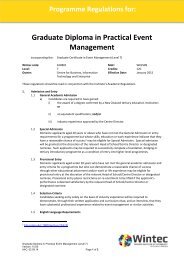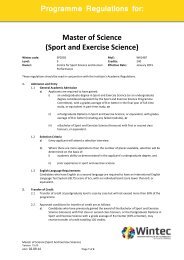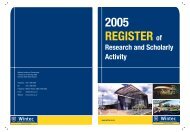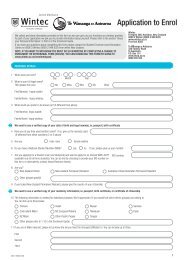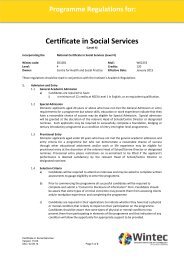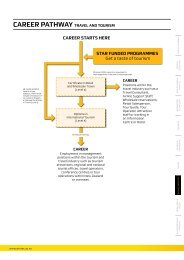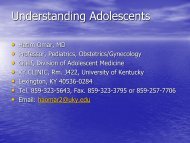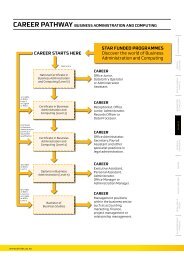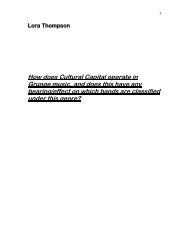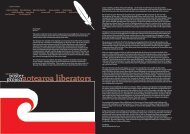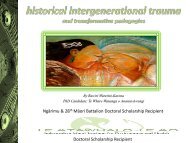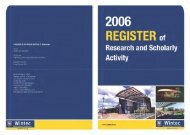2012 wintec annual report
2012 wintec annual report
2012 wintec annual report
You also want an ePaper? Increase the reach of your titles
YUMPU automatically turns print PDFs into web optimized ePapers that Google loves.
In <strong>2012</strong> we drove further innovation, customer focus<br />
and performance.<br />
We improved our academic performance for students, undertook<br />
more value-led initiatives for our students and employers,<br />
and expanded our internationalisation focus to include offshore<br />
delivery. We modernised our campus facilities, we were<br />
recognised with a business excellence award, and for the fifth<br />
consecutive year we posted a positive financial result.<br />
Our reputation for providing quality vocational and professional<br />
education, both in New Zealand and around the world,<br />
was enhanced through many initiatives, with continuous<br />
improvement at the forefront.<br />
We are proud of the successes and highlights of this year.<br />
We know they will enable us to perform well for our students<br />
and employers, now and into the future.<br />
Sound Financial Performance<br />
We posted a group surplus of $3.6m (4.1%), before adjustments<br />
associated with asset impairment.<br />
The operating surplus (before subsidiary companies, surplus<br />
on asset sales and asset impairment) was $3.9m or 4.5%, over<br />
the 3% threshold set by our monitoring agency, the Tertiary<br />
Education Commission (TEC). The increase in the number of our TEC<br />
Equivalent Fulltime Students (EFTS) was offset by lower funding<br />
in real terms from the TEC through its policy of not increasing<br />
funding by the Consumer Price Index (CPI). In <strong>2012</strong> we continued<br />
to find efficiencies and increased our revenue from international<br />
students. All in all it is a good financial result.<br />
We continued to receive a low risk assessment from TEC. This rating<br />
confirms that we have the capability to govern and manage well<br />
during a period of intensive capital development. This is pleasing<br />
as we embark on further change and modernisation.<br />
Our students<br />
In <strong>2012</strong> there were approximately 6700 EFTS. Despite a marked<br />
decline in Industry Training Organisation (ITO) EFTS over recent<br />
years, largely due to the recession, we have experienced growth<br />
in our core and international EFTS, and maintained levels in<br />
other areas.<br />
Over the past five years we have moved more provision to higher<br />
levels of study (level 4 and above), and this year we’ve seen 83%<br />
of our TEC-funded students engage in higher levels of study, an<br />
increase of 2% from last year. Nearly 75% of our Māori students<br />
study at level 4 and above, among the highest in the sector.<br />
Greater numbers of people studying for higher qualification<br />
levels benefits the region both economically and socially, and<br />
ultimately results in a more skilled workforce. We offer 10 degree<br />
programmes, seven degree-level programmes (graduate diplomas<br />
and certificates) and 11 post-graduate qualifications.



